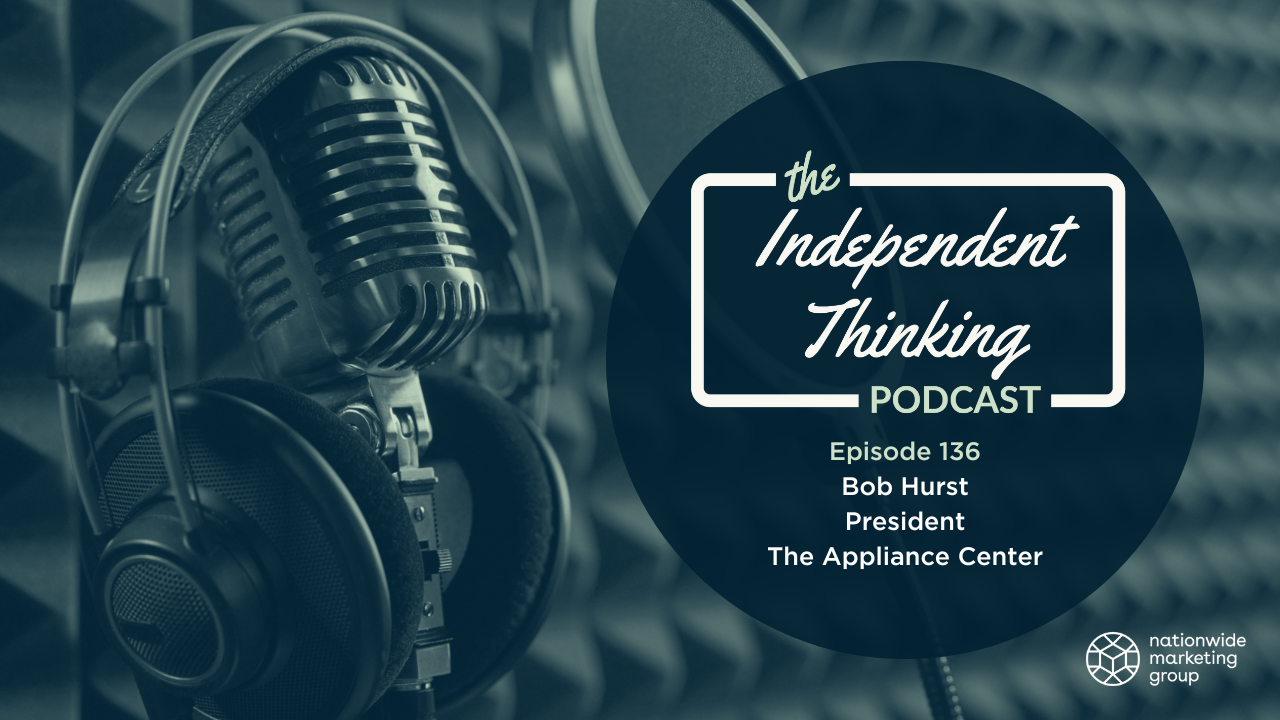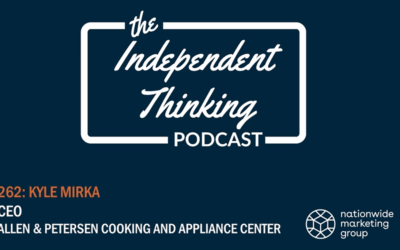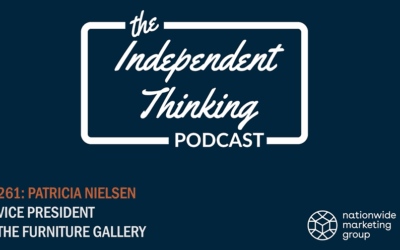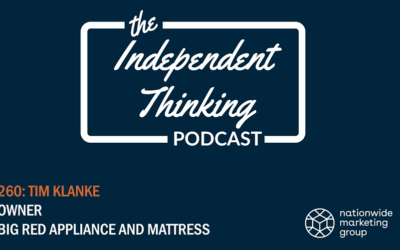In its 77-year history, The Appliance Center has weathered all sorts of storms. Most recently, the Panama City, FL, business had its main showroom rocked by Hurricane Michael in 2018. Though they’re still working out of a makeshift warehouse-turned-storefront, President Bob Hurst shares how they’ve remained successful.
Rob Stott: All right. We’re back on the Independent Thinking Podcast and ready to have a fun talk here today with a member down there. We were just in Orlando, Florida not too long ago for our PrimeTime show. And Bob Hurst, president of The Appliance Center down there, tell us what part of Florida are you in, Bob?
Bob Hurst: Well, I’m in the Panhandle. That’s Northwest Florida, Panama City. We’re on the coast. We’re a resort community.
Rob Stott: Gotcha. All right. Well, always nice to have, not only a member, but someone in the Robert family of names, Bob. Now, where you always Bob?
Bob Hurst: I’ve always been called Bob or Bobby. And you are Rob. You’ve always been Rob?
Rob Stott: Sir, I run the gamut. I’ve been Rob, Robbie, Robert, Bob, Bobby, the whole kit and caboodle, whatever you want to call me.
Bob Hurst: Yeah, I know the feeling. I know the feeling.
Rob Stott: It’s one of the most versatile names out there. So, awesome to have another one of the Robert families with us, but now, we appreciate you joining. I got an awesome story to dive into down there with The Appliance Center. But before that, I want to give you a chance. Tell us a little bit about yourself, about Bob Hurst and your background and path to retail.
Bob Hurst: Okay. Well, of course, I was born into a family that became merchants quite early. We’ve been in Panama City and merchants since about 1938, but my educational background is in archeology, believe it or not.
Rob Stott: Wow.
Bob Hurst: Yeah. I attended school here and then I studied archeology in England. And by the way, the queen just passed away a few minutes ago, is what I heard.
Rob Stott: I saw that. Yeah, yeah.
Bob Hurst: Yeah, it’s sad. Then I went to Iran and did some archeological excavation. I taught school. They taught Middle Eastern history. And about that time, my father was getting pretty aged and he needed some help here at the store. So, I came back and eventually took over the family business. Well, we’ve been in business 77 years, yes.
Rob Stott: Yeah.
Bob Hurst: Yeah. We’re the oldest retail store, I think, in Bay County.
Rob Stott: Well, the thing I love too, and we’ll dive into the history a little bit deeper, but the retail roots for you guys go back before the store too. I know grocery was a part of the family business as well. Is that right?
Bob Hurst: That’s correct. Actually, my grandparents got into the grocery business. My father took it over and enlarged the store. It became, I guess, the largest grocery store in 1940 in the area. But by 1941, the Army called him and he sold out and left; went off to war; came back after the war. He had been in the procurement department of the Army. So, he knew that all this surplus, army surplus, was out there afterward, leftovers from the war. And that’s how he got into that. That was our first business.
Rob Stott: That’s cool because it shows just from selling groceries to selling surplus supply and that sort of stuff, it ran in his blood. Right? Did you always feel like retail, is it something that has run in the family and was going to be your calling?
Bob Hurst: No, I didn’t. As far as I was concerned, I got interested in history and archeology. And so, that was what I did. I sent you some information and it was done in a history format. I’ve actually written a book and I do write articles, history articles, for the newspaper and the magazines and this sort of thing. So, yeah, I still love history. But business retail has been in our family for so long, I’m used to that as well. And I can say this much, I’m the second generation, but I think my father and my son probably are handling it a little bit better than I actually handled it. My son is all business.
Rob Stott: Oh, that’s awesome to hear. Like I said, we’ll dive in a little deeper. I do want to ask. We’re coming off of, I talked about it at the top, the PrimeTime experience. So, I want to give you a second to talk about it. Correct me, if I’m wrong. You took a little stroll around our show for you there at the Gaylord. Were you with us in PrimeTime?
Bob Hurst: Yes, I was. My son went down for the first shift and then I went down for the second. He left and I stayed. And yeah, I think the training classes were good. We enjoyed those, yeah.
Rob Stott: Awesome.
Bob Hurst: We learned a lot.
Rob Stott: It’s good to hear. Good to hear. Anything from that stand out of the classes you went to or the other experiences you had while you were there?
Bob Hurst: Well, of course, the other experiences, the Palooza, we benefited from the Palooza. And I got a kick out of go to the main event at the Universal. We ended up, my wife and I ended up at the karaoke bar and I didn’t realize we had so many talented people in the Nationwide.
Rob Stott: You put it nicely. No, no. There were some really good karaoke and singing going on. It feels like everyone took a stroll through that corner of the city walk there. It was pretty cool, but awesome to hear. Not too far from you guys, where you were, to be able to hop in and get there. Glad to hear that you guys had a good experience though.
Bob Hurst: Oh, yeah, yeah. Of course, it’s convenient being in Orlando. We were about five hours away, yeah.
Rob Stott: Sure. So, if someone walks into The Appliance Center today, what’s that customer experience like? What are you guys trying to show them or have them experience? And I know it’s interesting, and we’ll dive into why, but what is that intended or that elevator pitch on what you bring to your local community?
Bob Hurst: I imagine, if somebody walks in our store today, they’ll think they may be walking into something like a cross between an office and a warehouse. There’s no really good showroom in our place. And of course, that is because of Hurricane Michael that hit us in 2018. Hurricane Michael just about tried to destroy us but luckily… Our building was damaged badly. We lost a third off the upstairs wall. We lost the roof.
Rob Stott: Wow.
Bob Hurst: But luckily, I had a building next door. It was the old store and we just moved over there. It wasn’t really a place set up for a showroom, but we have made a makeshift showroom out of it. So, people that walk into our store today would think they were walking into a warehouse. There is a lot of things that’s not on display, but we’ve made our success from reputation. We’ve been there 77 years, as I said. And we’ve built up a good reputation. People know that we service what we sell. They know that we’ll take care of them. We probably do more business from referrals than we do from advertising or anything like that.
Rob Stott: And obviously, the hurricane that… You got a great… We talked about it before we jumped on here. The picture behind you, if you’re watching the video version of this podcast, reminiscent of flags going up over rubble. That’s actually a photograph, right? I’ll let you explain what’s going on there, but that’s from the community during the time of Michael.
Bob Hurst: Yes, yes. That was two or three days after the hurricane and our brick facade had collapsed. We had had trucks out there in front of it. The wall collapsed onto our trucks and a photographer happened to be in the area with a model. I guess, they were doing shots. So, he took a photo of this. It’s supposed to represent, in a way, the resilience of the community. United, we are strong. We are waving the American flag. That was the kind of impression that the photographer wanted to make with that photograph, and I like it. We’ve got it in a very prominent place in our store for people to see.
Rob Stott: Now, I know that area in Florida down there is a hotbed, if you will, of hurricane activity and things like that. Have you guys ever experienced… I imagine, the devastation of Michael unmatched, but have you seen anything like it in your time in retail?
Bob Hurst: No. Never seen anything like Hurricane Michael. It was about a 90-mile wide tornado, was what it was. I mean, it leveled everything in its path almost. In a park across the street from us, we had over 80 trees. After the storm, 16 were left.
Rob Stott: Wow.
Bob Hurst: That’s one example of the devastation that took place there.
Rob Stott: Yeah. Talk about it, not to reminisce and think back on that time, but what was it? Obviously, nothing you can prepare for, for that kind of damage. But talk about it. You mentioned the resilience and the ability to pick up, and fortunate to have the area next to you. What’s it been like transitioning to that space while still trying to maintain and run a retail business?
Bob Hurst: Well, we got moved into our temporary location in about three or four days. We were up and running. Well, maybe five and we were back. I mean, we had to keep our business going. We had to supply equipment. As bad as the hurricane was, it certainly was a selling opportunity as well, and we got back in business real quick. And the other store, we eventually got it put back together, our showroom. We got the building back together, but we have just about turned it into a warehouse right now and can’t get in there to remodel the interior because we turned it in… It’s full of appliances.
Because of this situation we’re in right now, with the supply. Supply chain is so bad right now. Our policy is, if something becomes available, we just usually order all of them because if you don’t, in a week, they’re all going to be gone. So, we have accumulated quite a lot of inventory as a result, an unusual amount of inventory. And that has detained us from getting our showroom back together, so that we can operate in a normal situation.
Rob Stott: Sure. No, it obviously sounds like a big… I was going to follow up by asking you what are some of the biggest challenges you faced. That obviously sounds like one, not being able to necessarily work on the old store, well, the new, old store, if you will, to get it to where you need to be able to get back in there. But what are some of those other challenges that you’ve been facing or… Yeah.
Bob Hurst: Of course, I guess, this is a day-to-day challenge. And that is showing people what we have, demonstrating to people what we have in stock. We don’t have the showroom to display everything we have. A lot of people just base their decisions on trusting us and what we tell them. Of course, like I said, we’ve been here long enough; people do trust us. Our success has been, I would say, primarily due to the fact that people know we service what we sell and we have parts. And I usually tell people. I make them aware of that, if they’re not. And I always tell them, “We don’t forget you after the sale here at The Appliance Center.” But yeah, I don’t know if that answers exactly what you were asking but-
Rob Stott: No, I think it shows the importance of maintaining that company culture. And not only does it allow you to have success, but then the community sees it. So, you’re committed to that mission of serving what you sell and it allows you, I think, as a business, to take any challenge head on. And when you need to, you can lean on the community that you’ve built that trust with and they can… Those are not-
Bob Hurst: Yeah, it hasn’t been easy. It hasn’t been easy. It seems like, since 2018, it’s just been one crisis after another, but we’re still standing and are actually doing quite well. I was trying to think about how many… We moved. We were in this old building up until about 2002, and then we moved into our new building. And I was trying to think how many appliances that we have probably sold since 2002, in other words, in 20 years. I would guess we probably sold, and this is just a wild guess, I would say 38,000 appliances in that length of time which, I guess, is a good amount for a small business.
Rob Stott: Yeah, absolutely. And you mentioned the challenge of being able to show customers what you’ve had during this time while you’re in a transition in between the old showroom and being able to get back into there and everything. Any benefit of a website, things like that? Have you guys been able to lean on that in terms of showing customers what you’ve got or being able to still get your name out there too within your community?
Bob Hurst: Absolutely. As I said, at the beginning, we’re a resort town and a lot of owners are absentee. They live in the north or somewhere else anyway, and we get a lot of business over the phone. So, the website has become a necessity. People can go on there and pick out something and order them by email, or they can phone us and order things. So, yeah, the website has become a great source. And right now, the front of our temporary headquarters has been torn up. They’re doing a street scape. So, you can’t hardly get in the front door anyway, but it hasn’t hurt us that bad because we do so much business over the phone.
Rob Stott: Yeah. No, that’s awesome. And it feels like it could be the answer to my next question, which was just going to be about, you’ve seen the business run from your father through to you. Now, you mentioned your son having a big role now in managing things. You’ve seen a lot of change and evolution in the business. I wonder if you can think of anything that stands out as maybe the most important transition that The Appliance Center has made in that 77-year history that’s, maybe it’s even more than one thing, but that’s allowed it to have sustained success.
Bob Hurst: Well, I think the technological age has certainly affected us a lot. Up until about 2002, we operated with no computers. So, that has been a great thing. Now, the other thing is that in 2002, my son began to take over the business and that is when he decided to get out of all this military surplus, all this hardware we were selling. We were like a general store and that’s when he decided it was going to be appliances, parts and service. And I think that was a good move. So many of the old-time hardware stores here, in fact, I don’t think there’s any left in Bay County. So, I think it was a good move just to get into appliances. And we’ve certainly, I think, had a greater amount of success now than we did previously.
Rob Stott: That’s a nice segue to it. We mentioned that we’d dive deeper into the history and we’ll include it too. I know you got some great resources to look at and stories on your website and things like that, that you shared with us. But I want you to walk us through it, because you mentioned obviously prior to 1941 and World War II there, your grandfather or your father was the… Grandfather.
Bob Hurst: It was my grandfather that originally started the grocery business, but he was getting up on in age and my father came in there and really took it over.
Rob Stott: And then that’s when he comes back from war, realizes the opportunity with the surplus. So, walk us through the path that The Appliance Center has been on since then.
Bob Hurst: The path that we’ve been on since then. Actually, we took on the name Surplus Sales Service and got our license in about 1948. And in the ’50s, we expanded into a second store but had some of the same type merchandise. But he also got into the frozen food business.
Rob Stott: Wow.
Bob Hurst: Selling freezers, and then you buy this food plan. The customer could order frozen foods of any kind. They could go through and make a list, and then we would deliver them to the customer. The frozen food bin, that was a trend that happened in the ’50s. Freezers had come out. Frozen food would become a big thing and that’s what happened. So, he got into that. Now, it didn’t last. Somewhere in the ’60s, he got out of that; abandoned that. And we got rid of our second store and then came back and just had the store we have now. And that’s, in a nutshell, the things he brought on.
Rob Stott: The frozen food, is that the intro to appliances or did it come before that? Because you think frozen food, freezers, the opportunity there. Was that the first step into appliances?
Bob Hurst: Well, my father got into appliances quite early. Sometime probably about 1950 is when he started selling appliances. But I can remember in the old store, it was just going in an old hardware type store, wooden floors, and he’d have some appliances sitting in there amongst everything else. There are still a few of those. You go to South Georgia and you can find some of those places.
But eventually, in the ’70s, he built another building behind, built another store behind our old one and he made a showroom. And that became a warehouse and a showroom for our appliances. So, that’s how that evolved. Then like I’ve already said, in 2002, my son came along, got rid of all that other stuff and concentrated on appliances.
Rob Stott: Seeing, you think to the early days, and again, I think it’s because you have a unique perspective of where the business was and what it is now, the transition of what appliances were then, you think of design and just how basic they were to what you see now in an appliance store and these packages and the sleek edges and curves and the technology that’s going on. Just reflect on that a little bit, just how appliances have evolved.
Bob Hurst: Yeah, yeah. Of course, back in old days, there was no electronics. Everything was mechanical. The idea of packaging didn’t seem, to me, to come along. I don’t remember selling packages to people until recently. It just seemed like people, back in the old days, just bought one or two appliances at a time. And of course, you didn’t have the boom, the building boom, like you have today.
Back then, Panama City was just a sleepy, little coastal town up until, I think, recently now. Yes, we’ve had the beach and we’ve had tourists for a long time, but it was the old type mom and pop hotels and motels and that sort of a thing. And today, of course, it’s condos and people actually own places. Like I said, we deal with a lot of absentee owners of places.
Rob Stott: No, it’s interesting. You talk about the history too, and it’s neat to see. I love talking to our members that have been around for decades and businesses that are 75 plus years old. And you get to learn a lot from that, I think, just the staying power of the business. You talked a little bit about the ability to evolve and what your son has done with focusing the business.
For continued success moving forward, what does that look like? And maybe whether it’s for your own business or advice in part on others, other members that you bump into, what would you tell them that you’ve learned that you think that they would find important to apply in their own business to make sure that they can continue to succeed?
Bob Hurst: Well, I think the small businessman, a small appliance man, is faced with the big box stores. And how do we deal with those? I think this is probably nothing new that I’ve got to say, but offering personalized service, having your own service department, having a parts department, I think that’s the thing where we can compete. We have something that the big boxes don’t have. And I think if you want to have a successful business, that’s what you’ve got to do. I’m sure that’s nothing new. Everybody’s heard it before, but again, it’s true. And I think, if people will stay on that path, that they will have a successful business. Yep.
Rob Stott: Right. I mean, something to be said about wise words and whether you’ve heard them before, having them reiterated, I think, is important too.
Bob Hurst: That’s right.
Rob Stott: The more you hear it, the more it rings true. And you realize that, well, maybe it’s not… I hear it a lot, but there must be something to it, if people keep talking about it.
Bob Hurst: Absolutely, yep.
Rob Stott: No, that’s awesome. Well, Bob, I appreciate that we’ve had a fun time talking today. I appreciate you peeling back the layers on The Appliance Center and sharing some information and some cool history too, some great photography. Again, if you’re watching the video version of this and can wish you continued success down there in Florida. Again, just appreciate the time.
Bob Hurst: All right. Well, thank you. Thank you for the opportunity to do this.
Rob Stott: Absolutely. Well, I feel like we’d reach out again too. You’ve mentioned the service side. There’s a whole other layer of conversations we could have around service and that side of the business. So, maybe we’ll have to have a follow-up podcast one of these days before long; see how things are going on that side.
Bob Hurst: Thank you.




